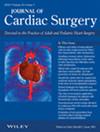Establishing a Surgeon-Led Adult Cardiac Surgery Quality Improvement Program
Abstract
Objective
The current article describes the methods utilized during the establishment of Kosuyolu Adult Cardiac Surgery Quality Improvement Program, shares our initial experiences, and provides insights into future directions.
Methods
Through inspiration from a notable example of high-performing collaborative quality initiative, we established a surgeon-led quality improvement program by voluntary participation of senior academic and early-career surgeons. Our new program aims to improve the quality of cardiac surgical care through methods of data acquisition and analysis, internal data validation, collaborative discussions on care processes and risk-adjusted outcomes, and development and implementation of quality improvement initiatives.
Results
We observed significant baseline variations in outcome measures including perioperative blood utilization, postoperative mechanical ventilation duration, and postoperative length of stay between surgeon groups. During the first 2 years of the Kosuyolu Adult Cardiac Surgery Quality Improvement Program, there were significant overall improvements from baseline in multiarterial grafting rates among all-comer patients undergoing isolated coronary artery bypass surgery and in unadjusted re-exploration rates after all cardiac surgical procedures. However, no significant improvements were noted in perioperative blood utilization, postoperative mechanical ventilation duration and hospital and intensive care unit length of stay.
Conclusion
Surgeon-led collaborative quality improvement programs are instrumental in enhancing the quality of healthcare services provided to cardiac surgical patients.


 求助内容:
求助内容: 应助结果提醒方式:
应助结果提醒方式:


